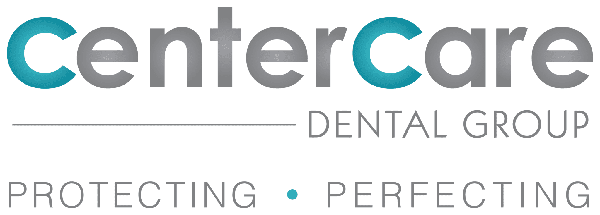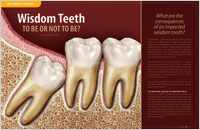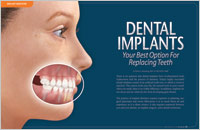The word “surgery” often brings to mind a stay in the hospital, general anesthesia, and perhaps a lengthy recovery period. However, the experience of having oral surgery is usually very different from that. Oral surgery is often performed in a dental office setting, under local anesthesia, with minimal recovery time. Oral Surgery can range from routine procedures such as tooth extractions and implant placement to more complex jaw realignment surgeries and emergency care for facial trauma.
Oral Surgery Procedures
Oral surgery procedures may be performed to relieve pain, treat an infection or trauma, restore function or improve a person’s appearance. Procedures and conditions treated include:
- Tooth Extractions. There are a variety of reasons why you may need a tooth or teeth removed. You may have a wisdom tooth that is impacted; a diseased tooth that can’t be saved; or overcrowded teeth that need to be removed so more room can be created to facilitate proper alignment during orthodontics.
- Dental Implants. Today’s preferred method of tooth replacement is a titanium dental implant, which is placed beneath the gum line and into the jawbone during a minor surgical procedure. The implant is then attached to a realistic-looking dental crown that is visible above the gum line and indistinguishable from a natural tooth.
- Oral Diagnosis & Biopsies. When a suspicious oral lesion is found, a biopsy is often used to detect or rule out oral cancer — a disease that is treatable if caught early. A biopsy involves removing a very small tissue sample for laboratory analysis.
- Corrective Jaw Surgery. Sometimes a person’s jaws don’t fit together properly. This can affect both jaw function and appearance.
- Snoring & Sleep Apnea. Excess tissue in the back of the throat may need to be removed in certain individuals with sleep apnea.
- TMD. When conservative remedies fail to relieve chronic jaw pain over a long period of time, surgery may be considered.
- Facial Trauma & Reconstructive Surgery. Facial injuries can affect not only a person’s ability to carry on basic life functions such as eating but also his or her appearance. Knocked-out teeth can sometimes be re-implanted or replaced with dental implants.
- Cleft Lip/Palate. These birth defects are among the most common, estimated to affect around one in 700-800 babies born in North America. With proper surgical treatment, the child has an excellent chance of leading a healthy, normal life.
What to expect
Before your oral surgery is performed, x-rays will often be taken to aid in diagnosis and treatment planning. A step-by-step explanation of the procedure along with your anesthesia options will be discussed, and you should feel free to ask any questions you have. Your recovery experience will depend on what procedure you are having as well as your general state of health. It’s always important to let your healthcare providers know what medications you are taking (both prescription and over-the-counter), any chronic health conditions you have, and whether you smoke. This will help ensure your safety and comfort — always the paramount concerns.




